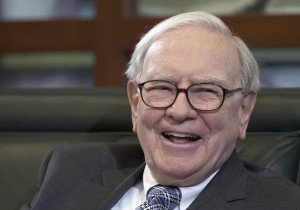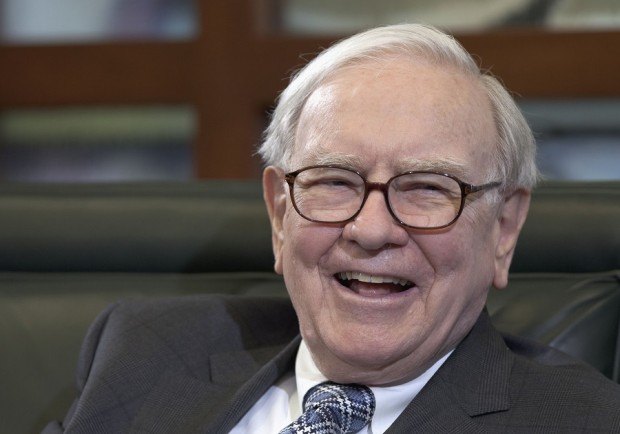When Harvard Business Review put together its 2015 list of chief executive elites—the world’s best performing CEOs—Berkshire Hathaway’s Warren Buffett failed to make the cut.

While Buffett actually didn’t make the list in 2014 either, HBR highlighted the fact that Buffett isn’t on the list this year mainly because he ranked No. 101 on a list the cuts off at No. 100. Using a two-part measure of performance, Buffett came in right behind Vodafone’s Vittorio Colao.
HBR also noted Berkshire’s “astronomical returns” over Buffett’s 45-year tenure, which would seem to make him a shoo-in to land a top spot given that long-term returns are baked into the formula used to identify standout executives.
So why didn’t he make the prestigious list?
“We measure market performance, but we have changed our methodology this year to also factor in social responsibility,” said Adi Ignatius, editor-in-chief of Harvard Business Review in a media statement. More precisely, HBR used environmental, social, and governance (ESG) performance data from investment research firm Sustainalytics this year. On that measure Buffett ranked 798 out of 907 CEOs examined—a ranking so low that it overshadowed stellar financial performance scores.
“Although the ESG ranking counts for only 20 percent of a CEO’s overall ranking, Buffett’s very low placement in it was enough to pull him out of the top 100,” HBR says in a sidebar to the full ranking article published in the November 2015 issue of the publication.
The article points to “poor disclosure on its governance and social policies” partially explaining the low ESG score. The other factor: when investing in other companies, Berkshire’s initiatives for addressing sustainability at those companies are weak relative to peer holding companies, according to Sustainalytics.
The changed methodology for measuring CEO success also kicked Amazon’s Jeff Bezos—last year’s top-ranked CEO—down to No. 87 on this year’s list. Although Bezos garnered the top financial score, his ESG ranking is 828 out of 907 CEOs.
In contrast, the top-ranked CEO for 2015—Lars Rebien Sørensen, who heads up Danish pharmaceutical giant Novo Nordisk—got high marks for financial performance and for ESG, ranking sixth on purely financial measures and 15th on ESG performance.
“In the long term, social and environmental issues become financial issues,” Sørensen told HBR (page 13 of the November edition).
Ignatius notes that Sørensen’s financial performance is partially attributable to his resistance to the idea that a company should diversify. In fact, 80 percent of Novo Nordisk’s revenue is tied to diabetes treatment.
In truth, however, Buffett’s diversified company beats almost every other CEO analyzed on a pure measure of total shareholder return over their entire careers. In that type of analysis, Buffett ranks No. 2 behind Leslie Wexner, the leader of L Brands (which sells lingerie, personal care and beauty products, apparel and accessories through brands like Victoria’s Secret, Bath & Body Works, and Henri Bendel).
Measuring Financial Performance
Still Wexner (ranked No. 11 overall this year) and Buffett weren’t on last year’s list either. What gives?
For each executive, HBR looked at three company financial metrics: industry-adjusted shareholder returns, country-adjusted shareholder returns, and increase in market capitalization over the CEO’s tenure.
The industry-adjusted returns—calculated to offset any increase attributable to rising overall fortunes of a hot industry—were unavailable prior to 1995, HBR noted. Because of this, HBR simply removed CEOs whose careers began before Jan. 1, 1995 from consideration in past years. Hence, Buffett wasn’t eligible in 2014.
For this year’s ranking, HBR computed the financial returns of CEOs who took office earlier “as if they began on Jan. 1, 1995.” So, while Buffett was eligible for the list this year, he was penalized by a methodology that ignored the value he created during his first 25 years at the company. Nevertheless, he still had the 23rd best overall financial performance of the 907 CEOs assessed.
As for the insurance industry, Carrier Management didn’t see any other executives with ties to insurance on this year’s list. The highest ranked CEO for a financial company of any type appears to be BlackRock’s Laurence Douglas Fink, who is ranked No. 25 overall (No. 5 on financial performance; No. 483 on ESG).
As with any attempt to develop a metric to rank performance, HBR’s suffers from another shortcoming that led to an unexpected high ranking for ex-Volkswagen CEO Martin Winterkorn.
In an uncomfortable disclosure of its own, HBR noted in a media statement that Winterkorn, who resigned amid the emissions scandal as HBR’s list was going to press, is ranked No. 20. This score—like all the others—was based on financial data through April 30, 2015. Back in April, VW also had a relatively strong ESG score (46) that has since been downgraded by Sustainalytics, according to HBR.
In the media statement, HBR also noted that only two women ranked in the top 100: Ventas CEO Debra Cafaro (No. 47) and TJX CEO Carol Meyrowitz (No. 81). Meyrowitz recently announced last week that she’s stepping down from her post in January, however.
Aside from male dominance, other common themes cited throughout the article include these:
- 85 percent of the CEOs head firms based in their native countries.
- 86 percent were promoted from within the companies they lead.
- The average age when they became CEO was 45.





















 AIG, Chubb Can’t Use ‘Bump-Up’ Provision in D&O Policy to Avoid Coverage
AIG, Chubb Can’t Use ‘Bump-Up’ Provision in D&O Policy to Avoid Coverage  Chubb CEO Greenberg on Personal Insurance Affordability and Data Centers
Chubb CEO Greenberg on Personal Insurance Affordability and Data Centers  Modern Underwriting Technology: Decisive Steps to Successful Implementation
Modern Underwriting Technology: Decisive Steps to Successful Implementation  Earnings Wrap: With AI-First Mindset, ‘Sky Is the Limit’ at The Hartford
Earnings Wrap: With AI-First Mindset, ‘Sky Is the Limit’ at The Hartford 






